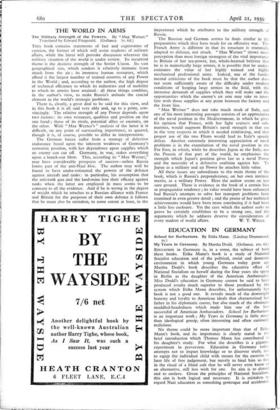THE WORLD IN ARMS
THIS book contains statements of fact and expressions of opinion, the former of which will assist students of military affairs, while the latter will provoke discussion wherever the military situation of the world is under review. Its recurrent theme is the decisive strength of the Soviet Union. Its vast geographical size, which renders it relatively immune from attack from the air ; its immense human resources, which afford it the largest number of trained reserves of any Power in the World ; and, according to the author, the high degree of technical efficiency to which its industries and of mobility to which its armies have attained : all these things combine, in the author's view, to make Russia's attitude the crucial element in the world's strategic problems.
There is, clearly, a great deal to be said for this view, and in this book it is all said very ably and, up to a point, con- vincingly. The relative strength of any Power depends upon two factors : its own resources, qualities and position on the one hand ; those of its rivals, potential allies or enemies, on the other. With "Max Werner's " analysis of the latter it is difficult, on any point of outstanding importance, to quarrel, though it is, of course, possible to differ in interpretation.
The German forces suffer from a strategy of defective endurance based upon the inherent weakness of Germany's economic position, with her dependence upon supplies which an enemy can cut off. Germany, in war, stakes everything upon a knock-out blow. This, according to "Max Werner," may have considerable prospects of success—unless Russia forms part of the anti-Nazi bloc. The author may well be found to have under-estimated the powers of the defence against aircraft and tanks : in particular, his assumption that the anti-tank gun and the land-mine lose their efficacy against tanks when the latter are employed in mass seems to be contrary to all the evidence. And if he is wrong in the degree of weight which he attaches to a Russian affiance with France and Britain for the purposes of their own defence it follows that he must also be mistaken, to some extent at least, in the
importance which he attributes to the military strength of Russia.
The Russian and German armies he finds similar in the preparations which they have made for an offensive war. The French Army is different in that its structure is essentially adapted to defence, not attack. "Max Werner" shows more perception than most foreign strategists of the vital importance to Britain of her sea-power, but, whole-hearted believer that he is in numerically large armies, it is possible that he under- estimates the value of her highly trained and highly mechanised professional army. Indeed, one of the funda- mental criticisms of the book must be that the author does not seem sufficiently aware of the difficulty under modern conditions of keeping large armies in the field, with the immense demands of supplies which they will make aid the opportunities which the enemy's air arm may take to inter- fere with those supplies at any point between the factory and the front line.
"Max Werner" does not take much stock of Italy, and one of his most interesting passages consists of an appreciation of the naval position in the Mediterranean, in which he gives his opinion that France, with her light cruisers and sub- marines, would augment Britain's naval strength in that sea in the very respects in which it needed reinforcing, and that proper use of the two Fleets would lead to Italy's speedy defeat. Another extremely interesting appreciation of naval problems is in the examination of the naval position in the Far East, in which, while he describes Japan as the Italy, not the Prussia of that part of the world, he emphasises the strength which Japan's position gives her as a naval Power and the necessity of a defensive coalition against her. To Japan as a military and air Power he attaches little value.
All these issues are subordinate to the main theme of the book, which is Russia's preponderance, on her own intrinsic merits, as a military Power. Here the author seems on less sure ground. There is evidence in the book of a certain bias or propagandist tendency ; its value would have been enhanced had Russia's attempts to solve her transport problems been examined in even greater detail ; and the praise of her technical achievements would have been more convincing if it had been a little less cocksure. Yet the case which the author seeks to prove he certainly establishes to be a strong one, and the arguments which he adduces deserve the consideration of










































 Previous page
Previous page